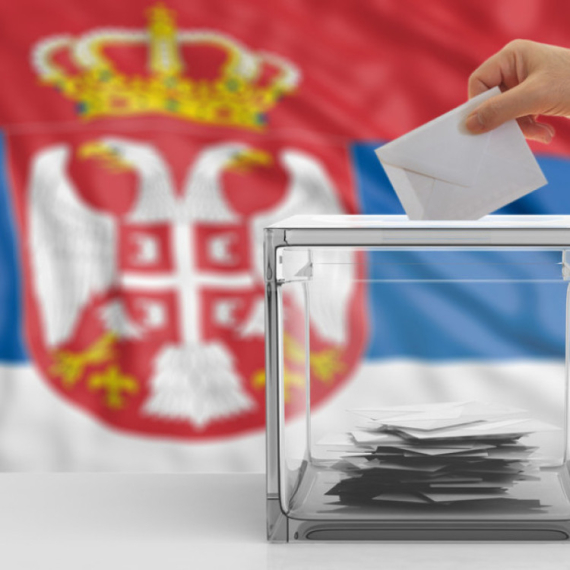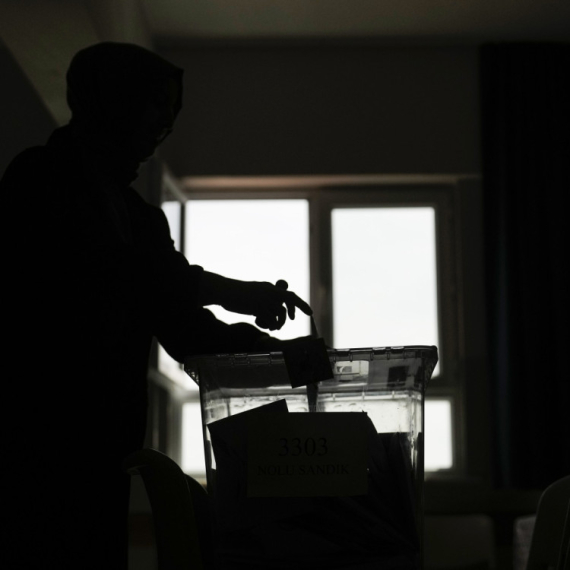DS: Govt. collapse is not inevitable
Dragan Šutanovac does not believe the PM’s remarks on loss of confidence in the DS and G17 Plus means the end of the govt.
Saturday, 08.03.2008.
09:30

Dragan Sutanovac does not believe the PM’s remarks on loss of confidence in the DS and G17 Plus means the end of the govt. “I personally don’t expect the government to fall, but I’m not scared of elections,” the defense minister and Democratic Party vice-president told daily Politika. DS: Govt. collapse is not inevitable “Clearly, Mr. [Vojislav] Kostunica did not have confidence in his coalition partners in the second round of presidential elections, and didn’t support President Boris Tadic or his policies. Now, something has been said that, in principle, is nothing new. The government still has a democratic capacity. Three-quarters of the government is of a pro-European character. The government has no problem, he can ask parliament and sort things out there,” said Sutanovac. In the minister’s opinion, “the prime minister has no need to make such statements, even if the government’s time is up.” “He can call a session and explain his proposal or ask a proposal to dissolve parliament to be explained, which would be forwarded to the president. Alternatively, he can send a request to the speaker to call a session where the government would be restructured with a new majority in parliament,” he explained. Asked if he expected things to come to that, Sutanovac said that were the president to be asked to dissolve parliament, a government decision would be required, and “in such circumstances, the prime minister’s talk of lack of confidence could not be included in such a proposal.” “We are the majority in government and no decision can be taken without the DS. Is there any logic in the majority leaving the minority to run the government? Leaving the government would be running away from problems, and would mean destabilization, which we oppose,” said the minister. He said that it was no problem for the parliament to make a decision that was at odds with the policy of the government. “If the government did not do this, a new majority in parliament could be formed or elections called,” Sutanovac concluded. Democratic Party of Serbia (DSS) deputy leader Milos Aligrudic said that one way out of the government crisis was for the EU “to clearly say where it sees Serbia’s borders,” while DS Vice-President Bojan Pajtic said that the “only true way out” was for the DSS to drop its support for the Radicals’ resolution on protection of Serbia’s territorial integrity in relations with international organizations, particularly the EU. In “a stand-off” with Pajtic, Aligrudic said that “if Olli Rehn says that he recognizes our country’s internationally recognized borders, the dispute will be over, and we’ll continue integration with Brussels.” The DSS official said that the DS’s accusation that, by supporting the Serb Radical Party’s (SRS) resolution, the DSS was distancing Serbia from the EU, “a change of subject.” Pajtic said that the Kosovo resolution could have fateful consequences for Serbia’s survival, as it set the EU impossible conditions, for the 27 states to state their position on Kosovo, even though it was well known that the EU had no such powers. “The resolution is pointless, because the majority of EU members have not yet recognized Kosovo independence, while some have announced that they won’t even do so. Setting pointless conditions is a sign that the SRS, DSS and Socialists have chosen an anti-European path, suppressing, moreover, the will of the people. Obviously, no-one responsible in Serbia will recognize Kosovo independence, but we don’t want to deny Serbia the European path,” said the DS official. “That resolution is not just directly targeted against Serbia’s future, yet is somehow offensive to Spain, Greece and other members that do not recognize Kosovo. By that logic, we should come out in the UN, the OSCE, the Council of Europe, as there are countries there too that oppose an independent Kosovo,” he concluded. Dragan Sutanovac (FoNet, archive)
DS: Govt. collapse is not inevitable
“Clearly, Mr. [Vojislav] Koštunica did not have confidence in his coalition partners in the second round of presidential elections, and didn’t support President Boris Tadić or his policies. Now, something has been said that, in principle, is nothing new. The government still has a democratic capacity. Three-quarters of the government is of a pro-European character. The government has no problem, he can ask parliament and sort things out there,” said Šutanovac.In the minister’s opinion, “the prime minister has no need to make such statements, even if the government’s time is up.”
“He can call a session and explain his proposal or ask a proposal to dissolve parliament to be explained, which would be forwarded to the president. Alternatively, he can send a request to the speaker to call a session where the government would be restructured with a new majority in parliament,” he explained.
Asked if he expected things to come to that, Šutanovac said that were the president to be asked to dissolve parliament, a government decision would be required, and “in such circumstances, the prime minister’s talk of lack of confidence could not be included in such a proposal.”
“We are the majority in government and no decision can be taken without the DS. Is there any logic in the majority leaving the minority to run the government? Leaving the government would be running away from problems, and would mean destabilization, which we oppose,” said the minister.
He said that it was no problem for the parliament to make a decision that was at odds with the policy of the government.
“If the government did not do this, a new majority in parliament could be formed or elections called,” Šutanovac concluded.
Democratic Party of Serbia (DSS) deputy leader Miloš Aligrudić said that one way out of the government crisis was for the EU “to clearly say where it sees Serbia’s borders,” while DS Vice-President Bojan Pajtić said that the “only true way out” was for the DSS to drop its support for the Radicals’ resolution on protection of Serbia’s territorial integrity in relations with international organizations, particularly the EU.
In “a stand-off” with Pajtić, Aligrudić said that “if Olli Rehn says that he recognizes our country’s internationally recognized borders, the dispute will be over, and we’ll continue integration with Brussels.”
The DSS official said that the DS’s accusation that, by supporting the Serb Radical Party’s (SRS) resolution, the DSS was distancing Serbia from the EU, “a change of subject.”
Pajtić said that the Kosovo resolution could have fateful consequences for Serbia’s survival, as it set the EU impossible conditions, for the 27 states to state their position on Kosovo, even though it was well known that the EU had no such powers.
“The resolution is pointless, because the majority of EU members have not yet recognized Kosovo independence, while some have announced that they won’t even do so. Setting pointless conditions is a sign that the SRS, DSS and Socialists have chosen an anti-European path, suppressing, moreover, the will of the people. Obviously, no-one responsible in Serbia will recognize Kosovo independence, but we don’t want to deny Serbia the European path,” said the DS official.
“That resolution is not just directly targeted against Serbia’s future, yet is somehow offensive to Spain, Greece and other members that do not recognize Kosovo. By that logic, we should come out in the UN, the OSCE, the Council of Europe, as there are countries there too that oppose an independent Kosovo,” he concluded.
















Komentari 4
Pogledaj komentare